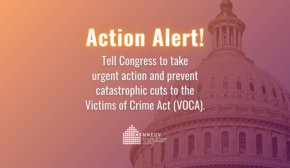Economic Justice Policy
Paid Leave, Equal Pay, and Living Wage: Workplace Policies That Help Survivors
Personal safety and economic security are inextricably linked for victims of domestic violence.
Financial abuse is a common tactic used by abusers to gain power and control in a relationship. The forms of financial abuse may be subtle or overt but, in general, include tactics to limit the partner’s access to assets, conceal financial information, or ruin a survivor’s financial profile. Even after a victim has left the abuser, the impact of ruined credit scores, sporadic employment histories, and legal issues caused by the violence may make it extremely difficult to pursue long-term economic security while staying safe. For many victims, concerns over their ability to provide financially for themselves and their children are a significant reason for staying in or returning to an abusive relationship.
When survivors of domestic violence have stable access to resources that help them build economic resiliency, they and their families are much more likely to remain safe and secure.
Policy Solutions
In almost any workplace, there are likely to be individuals affected by domestic violence. While it is unusual for perpetrators to direct violence at others in the workplace, the violence nevertheless affects not only the victims, but also the lives of those around them, including co-workers and employers. Additionally, domestic violence has an impact on our national economy, whether viewed from the standpoint of healthcare costs or workplace productivity.
Employees who are victims may need workplace supports to help keep themselves and their co-workers safe and productive.
- Paid sick and safe days legislation would permit victims to take time off of work to address the health consequences of violence or to attend to other critical safety needs such as filing for an order of protection or cooperating with law enforcement, without compromising their jobs or economic stability.
- Non-discrimination legislation would permit survivors to ask for important safety accommodations such as changing work hours, and would prohibit employers from firing employees because of their status as a victim of domestic violence.
- Access to unemployment insurance can significantly assist survivors in sustaining economic stability if they lose their jobs because of domestic violence, or need to relocate because of concerns about their safety or that of an immediate family member. While the majority of states, territories and the District of Columbia of have enacted specific laws extending access to unemployment insurance to survivors of domestic violence (and in some instances, to survivors of sexual assault), some states do not afford this protection to victims. This variation, combined with the increasingly national or multi-state nature of workplaces, means that two survivors working side-by-side may not have access to the same protections if they live in different states. Federal legislation is necessary to remedy this fundamental inequity.
- Like all women, survivors of domestic violence (who are predominantly women), would benefit from equal pay initiatives. As long as women make less than men for performing the same work, survivors’ ability to gain financial stability and independence is hampered, as the amount of time that a survivor might need to continue relying on support from an abuser could extend longer than necessary.
- Increasing the minimum wage will better enable survivors, and all women, to build assets to help them and their families meet both daily and long-term needs. A low minimum wage disproportionately affects women because women, and especially women of color, are much more likely hold low-wage jobs than men. Low-wage workers are also particularly vulnerable to exploitation (low wages, wage theft, unsafe working conditions, domestic and sexual violence, no opportunities for advancement, etc.). Limited skills, inadequate education, language ability, and immigration status make workers more vulnerable to exploitation and less likely to want to, or to be able to, challenge it for fear of retaliation, including job loss, sexual violence and deportation.
Having access to affordable, quality childcare will also greatly increase victims’ safety and stability. Because of a lack of options in the community, many domestic violence survivors often rely on their abusive partners or ex-partners, or the abuser’s family members, to provide childcare. This can place survivors in danger of further or increased physical and/or emotional abuse. Also, abusers may intentionally cancel or change their plans to provide childcare as a tactic to interfere with the victim’s work.
The Affordable Care Act (ACA) is a strong step forward in terms of ensuring that survivors of domestic violence can access health care without compromising their financial stability. The ACA makes available tax credits and cost-sharing reductions to help reduce the cost of coverage purchased through the marketplaces. In addition, the IRS and the Treasury Department have issued guidance that exempts domestic violence victims from the requirement that married couples must file their taxes jointly in order to receive the premium tax credit under the ACA. This means that domestic violence victims, whether married or unmarried, may file their taxes separately and will still be eligible to receive a tax credit to help pay for their premiums. For those survivors who are still unable to get coverage, the ACA provides a hardship exemption for those who have recently experienced domestic violence. The exemption, available here, is straightforward and, importantly, does not require documentation of victimization.
Access to social safety nets like TANF (including Family Violence Option waivers), SNAP, and SSDI are also critical in providing increased economic stability for survivors. Many victims remain in abusive relationships or unsafe situations because they cannot afford to leave. When victims do flee, many do so without any financial resources. Addressing the basic financial needs and rights of survivors and their children significantly improve survivors’ ability to find safety, while building long-term security for themselves and their children.





